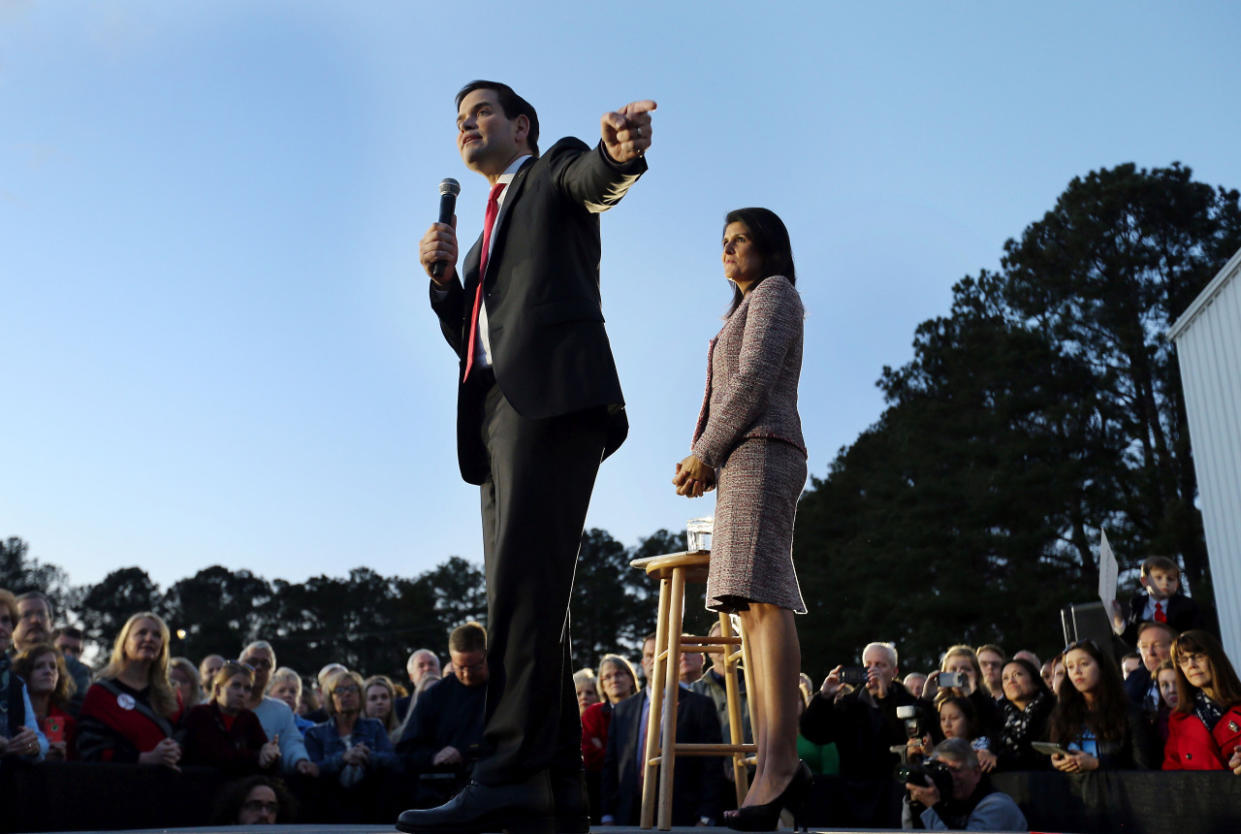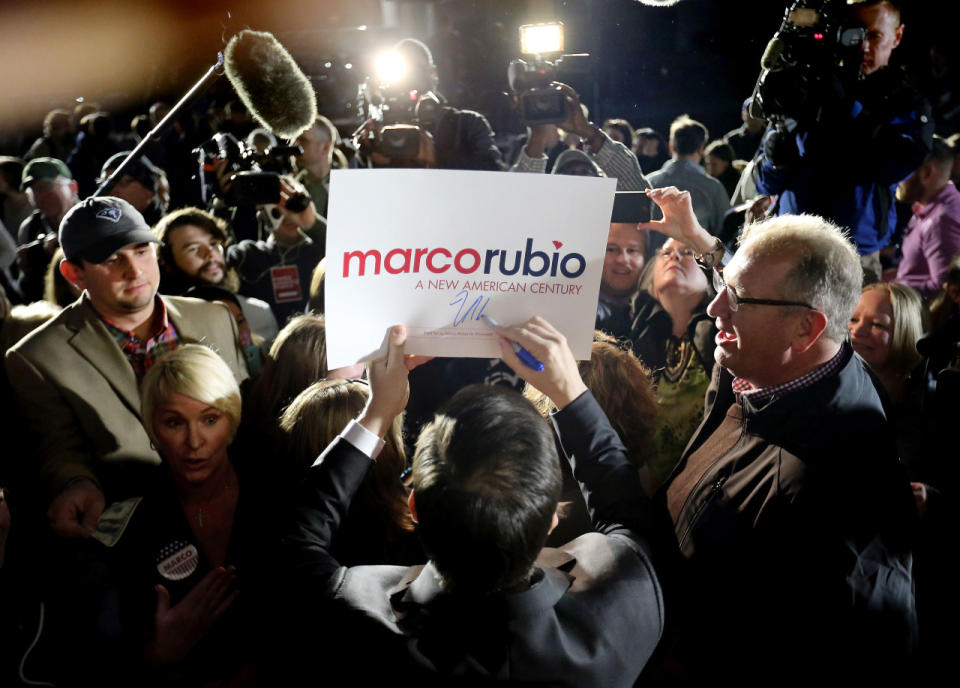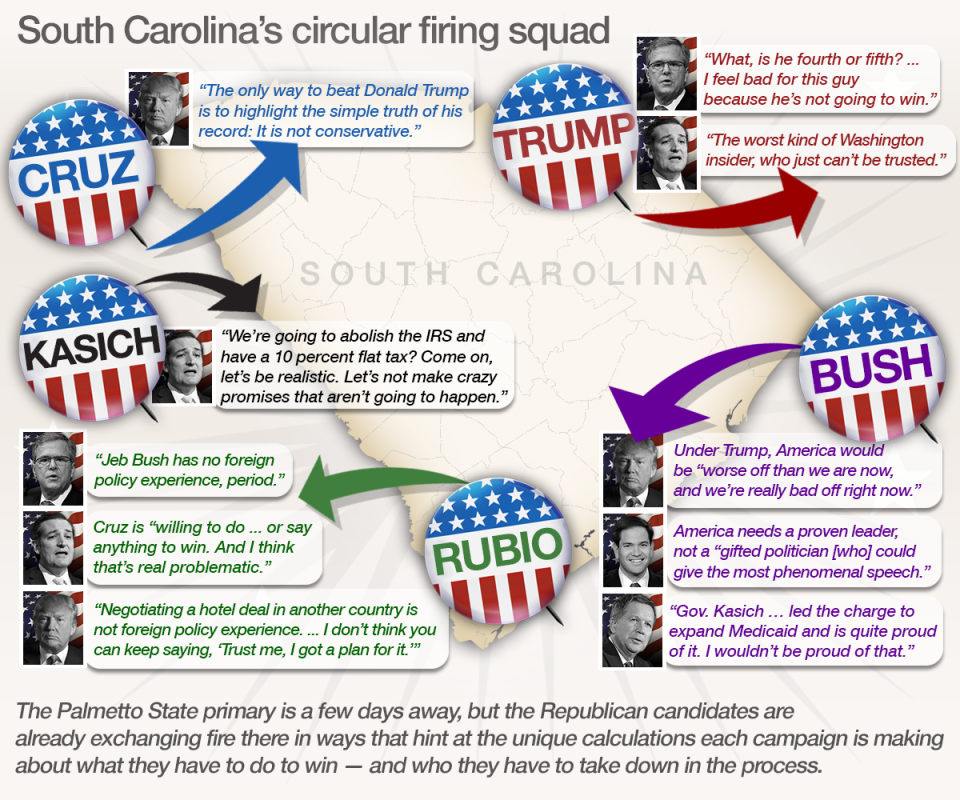Rubio and Trump present GOP with choice of radically different futures

South Carolina Gov. Nikki Haley stands with Republican presidential candidate Sen. Marco Rubio in Chapin, S.C., on Thursday. (Photo: Grace Beahm/The Post And Courier via AP)
ANDERSON, S.C. — The choice of two very different futures for the Republican Party was on vivid display here Thursday.
In this northwestern corner of South Carolina, a 44-year-old Cuban-American U.S. senator who’s running for president campaigned with the 44-year-old Indian-American governor of the state, a woman, who endorsed him Wednesday. They were joined by the state’s junior U.S. senator, a 50-year-old African-American. It was a picture of youth, optimism and diversity.
“This is the face of conservatism,” said Marco Rubio, the Florida senator who is trying to battle his way back to the front of the Republican presidential field after a setback last week in the New Hampshire primary. South Carolina Gov. Nikki Haley’s endorsement of Rubio has given him a sense of momentum as Saturday’s primary vote approaches.
Meanwhile, down on the coast the same day, a 69-year-old businessman publicly feuded with none other than Pope Francis, the head of the Catholic Church. Donald Trump not only rebuffed criticism by Francis of his support for a wall along the U.S.-Mexico border but also said that if the Vatican is ever attacked by terrorists, the pope “would have only wished and prayed” that Trump had been president to stop the attack.
Trump accused Francis of being used “as a pawn” by a Mexican government that he said had “made many disparaging remarks about me to the pope.” How Trump had acquired knowledge of those conversations between the pope and the Mexican government, he did not say.
Slideshow: Republican candidates duke it out in South Carolina >>>
Trump went on, in the first of two rallies he held in the Palmetto State Thursday, to continue his verbal assaults on rivals Ted Cruz and Jeb Bush, though he ignored Rubio. Speaking at a rally in Kiawah, S.C., Trump repeatedly mocked Bush and Cruz as beholden to lobbyists while talking up his own decision to self-fund his campaign.
Trump repeatedly trashed Cruz as “dishonest,” at one point repeating an anecdote he attributed to an “Oklahoma senator” who, Trump said, described Cruz as “one of the most dishonest people he’s ever worked with.” Tom Coburn, the former Oklahoma senator to whom Trump was referring, has called this description an “absolute fabrication.”
Later, at a rally in Gaffney, Trump again bashed Cruz as a “liar,” reminding voters of the controversy over the Texas senator’s staffers spreading rumors about Ben Carson dropping out of the race ahead of the Iowa caucuses. “He lies, he lies badly. He lies, that guy lies,” Trump said. “That guy does not tell the truth. He holds up his Bible and then he lies. … I agree with Rubio on that. The guy lies.”
In contrast, Rubio delivered a highly aspirational message on the stump, returning frequently to his core theme: that the 2016 election is “a referendum on our identity as a nation, as a people.”
Rubio told the story of his parents, who came from Cuba and worked in service jobs to claw their way into the middle class without knowing much English or having more than an elementary school education. “They both lived to see all four of their children live a life better than their own. That happens to be my story, but I would say to you that that’s our story,” Rubio said. “That’s the story of your governor.”

Rubio signs autographs during a rally on Wednesday in Chapin, S.C. (Photo: Grace Beahm/The Post And Courier via AP)
It has been a challenge for Rubio to balance recognition of the anger and anxiety percolating up from the grassroots with his inherently hopeful personal narrative on the stump. On Thursday he said, “As dark and difficult as things may appear right now I believe with all my heart that the greatest days in American history are within the reach of this generation.”
And he returned to his theme of the election as a referendum on American identity, saying that when the story of the 2016 election is told, it will be that “after eight years of Obama, we almost got it wrong until we remembered who we are.” (Getting it wrong seemed to be a reference by Rubio to Trump’s frontrunning candidacy.)
South Carolina Sen. Tim Scott, speaking to reporters after Rubio’s event, said Republicans have lost the popular vote in five out of the last six presidential elections because they have lacked a hopeful message. “If you don’t know how to inspire the American electorate, the chances are very high it will be six out of the last seven,” Scott said.
“I think you can make a point or you can make a difference,” Scott added when asked what he’d say to voters currently supporting Trump.
Rev. Tony Qualkinbush, 53, who has pastored a small Southern Baptist congregation in Central, S.C, for 16 years, said he was brought to tears by Rubio’s family story because it reminded him of his own family’s struggle.
Qualkinbush said he was still deciding between Rubio and Cruz. Haley’s endorsement of Rubio, along with Scott’s, had made him think, the pastor said. Cruz seems to have “more seasoning,” Qualkinbush said, and Rubio seems “impulsive” and “impatient.” But Haley and Scott’s support for Rubio “causes me great pause,” Qualkinbush said.
Rubio has almost entirely avoided squaring off with Trump, and on Thursday continued to do so, soft-pedaling when asked about Trump’s feud with the pope. Rubio said the U.S. has a responsibility to protect its borders, going out of his way to avoid criticizing Trump. As for Pope Francis’ criticism of building a border wall, Rubio pointed out that the U.S. accepts around a million people a year to come into the country.
“I think the Holy Father recognizes, or should recognize, and I believe he does, how generous America is,” Rubio said.
As Rubio rises, however, he increasingly becomes a threat to Cruz, who risks falling to third place behind Rubio. The two senators — essentially tied for second place behind Trump in polls of South Carolina voters — exchanged verbal punches on Thursday.
The Cruz campaign unveiled a website tying Rubio to President Obama, portraying him as agreeing with the Democratic president on a host of issues like immigration reform, a carbon cap and trade system, trade, gun rights and same-sex marriage.
“Marco Rubio is the Republican Obama,” the Cruz campaign said on its anti-Rubio site, turning a common positive characterization of his opponent into a negative. “After more than seven years of the destructive policies of President Obama, we shouldn’t replace him with his Republican clone.”
Rubio hit back, pointing to a Photoshopped image of himself shaking Obama’s hand on Cruz’s website to argue that Cruz was misleading voters. “This is now a disturbing pattern, guys. Every day they’re making things up. In this case they literally made up a picture, and what I find startling is that he’s attacking me on trade,” Rubio said, noting that Cruz spoke in favor of the Trans-Pacific Partnership trade bill before he voted against it.
The Cruz campaign ended the day by slamming Rubio for failing to show up to speak to several thousand people at an event hosted by talk radio personality Mark Levin. Rubio’s campaign said he was behind schedule, and Rubio skipped the event — which was heavy on Cruz supporters — to appear on Megyn Kelly’s show on Fox News.
Cruz spokesman Rick Tyler said Rubio “isn’t even going to try to compete for the votes of conservatives in South Carolina or anywhere else.”
Scott, the U.S. senator supporting Rubio, said the attacks from Cruz were “indicative of the fact that the momentum is heading [Rubio’s] direction, and that’s why you see so many people being more and more negative.”
Gov. Haley seemed to be amused by the mudslinging while speaking to reporters with Rubio.
“When you come to South Carolina, it’s a blood sport. Politics is a blood sport,” Haley said with a smile. “I wear heels. It’s not for a fashion statement. It’s because you gotta be prepared to kick at any time. Having said that, South Carolinians are used to this and they can cut through the mud … and make good decisions.”
Holly Bailey contributed reporting from Kiawah Island.



